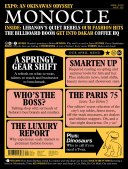
Issue 132
Monocle’s well turned-out April issue reveals a shift in how the luxury industry looks at the world. Expect interviews with leaders of top brands and retailers, a dedicated guide to Paris, reports on Lebanon’s quiet rebels and Dakar’s unexpected prosperity. Plus: the billboard boom and fresh reporting on everything from art to architecture and design to diplomacy.
In This Issue
Oops! No content was found.
Looks like we no longer have content for the page you're on. Perhaps try a search?
Return Home

